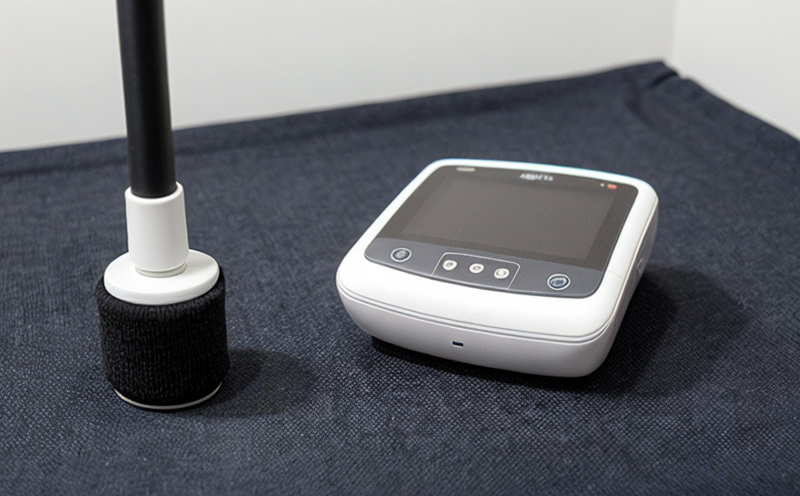ISO 13934 Tensile strength of e-textile base fabrics
The International Organization for Standardization (ISO) standard ISO 13934 provides a method to determine the tensile strength and elongation at break of electronically enhanced or electronic textile (e-textile) base fabrics. This service is critical in ensuring that e-textiles meet stringent performance requirements, especially where durability and reliability are paramount.
E-textiles combine traditional textile materials with electronics to create smart textiles capable of performing a wide array of functions such as sensing, communication, energy harvesting, and more. The tensile strength test ensures the integrity of these base fabrics under various conditions, which is essential for the long-term performance and reliability of e-textiles.
The standard defines the procedure for testing electronic textile base fabrics, specifying the type of specimens to be used, the appropriate clamping fixtures, the rate of loading, and the measurement of force and elongation. It also provides guidance on how to report the results in a manner that is clear, accurate, and repeatable.
Understanding the tensile properties of e-textiles helps manufacturers ensure that their products will withstand the mechanical stresses encountered during use. This service ensures compliance with international standards, which are crucial for market access and quality assurance.
The test apparatus used in this service typically includes a universal testing machine capable of applying controlled loads to the fabric specimens. Specimens are carefully prepared by cutting rectangles of the specified dimensions from the e-textile base fabrics. These specimens are then clamped into the appropriate fixtures on the testing machine, which applies force at a specified rate until failure occurs.
The process involves monitoring both the applied load and the corresponding elongation to determine the tensile strength and elongation at break. The results are recorded meticulously and reported in accordance with ISO 13934 guidelines.
This service is particularly important for quality managers, compliance officers, R&D engineers, and procurement teams working within the textile sector. It ensures that e-textiles meet stringent performance requirements, which is essential for their long-term reliability and success in various applications.
Understanding the tensile properties of e-textiles helps manufacturers ensure that their products will withstand the mechanical stresses encountered during use. This service ensures compliance with international standards, which are crucial for market access and quality assurance. By adhering to these standards, businesses can enhance customer confidence and satisfaction, knowing that their products meet the highest levels of performance and reliability.
The tensile strength test is a critical component in the development and production processes of e-textiles. It ensures that the base fabrics used in these advanced materials are robust enough to withstand various mechanical stresses without compromising on functionality or design. This service supports the broader goal of innovation within the textile sector by providing accurate, reliable data essential for product development.
By leveraging ISO 13934, manufacturers can ensure their e-textiles meet the necessary standards and regulations, thereby enhancing marketability and customer satisfaction. The test results provide valuable insights into the performance characteristics of the fabrics, enabling informed decisions about material selection, design optimization, and process improvements.
Why It Matters
The tensile strength test is crucial for ensuring that e-textiles are robust enough to withstand mechanical stresses encountered during use. This service helps manufacturers meet stringent performance requirements, which are essential for the long-term reliability of their products. Compliance with international standards like ISO 13934 ensures market access and quality assurance.
- Ensures compliance with international standards
- Enhances product durability and reliability
- Supports innovation within the textile sector
- Improves customer confidence and satisfaction
- Facilitates informed decisions about material selection, design optimization, and process improvements
The tensile strength test is a critical component in the development and production processes of e-textiles. It ensures that the base fabrics used in these advanced materials are robust enough to withstand various mechanical stresses without compromising on functionality or design.
By adhering to these standards, businesses can enhance marketability and customer satisfaction, knowing that their products meet the highest levels of performance and reliability. The test results provide valuable insights into the performance characteristics of the fabrics, enabling informed decisions about material selection, design optimization, and process improvements.
Quality and Reliability Assurance
- Clamping fixtures: Ensures accurate force application to the specimen
- Rate of loading: Specifies the controlled rate at which force is applied during the test
- Specimen preparation: Careful cutting and handling of specimens to ensure consistent results
- Data recording: Continuous monitoring and accurate logging of force and elongation data
- Reporting: Detailed, standardized reporting in accordance with ISO 13934 guidelines
The quality and reliability assurance process for this service involves several key steps. Clamping fixtures are crucial as they ensure that the specimen is held securely during the test, preventing slippage or misalignment. The rate of loading is specified to ensure uniform force application, which is essential for accurate results.
Specimen preparation is a critical aspect of this process. Specimens must be carefully cut from e-textile base fabrics according to the specified dimensions and orientation. This ensures consistency in testing and comparability between different samples.
Data recording during the test involves continuous monitoring of both the applied load and the corresponding elongation. This data is logged meticulously for later analysis, ensuring that all relevant information is captured accurately. The final step in this process is reporting, which involves compiling the recorded data into a standardized format in accordance with ISO 13934 guidelines.
These steps ensure that the test results are accurate, reliable, and repeatable, providing valuable insights into the performance characteristics of e-textile base fabrics. This service supports the broader goal of innovation within the textile sector by providing accurate data essential for product development.





